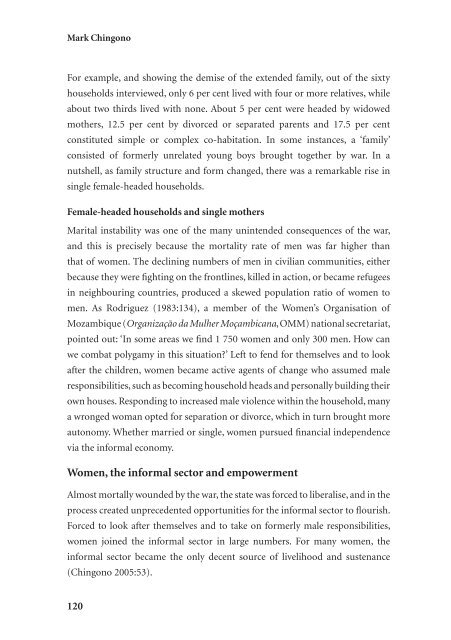ACCORD-ajcr-2015-1
ACCORD-ajcr-2015-1
ACCORD-ajcr-2015-1
- No tags were found...
Create successful ePaper yourself
Turn your PDF publications into a flip-book with our unique Google optimized e-Paper software.
Mark Chingono<br />
For example, and showing the demise of the extended family, out of the sixty<br />
households interviewed, only 6 per cent lived with four or more relatives, while<br />
about two thirds lived with none. About 5 per cent were headed by widowed<br />
mothers, 12.5 per cent by divorced or separated parents and 17.5 per cent<br />
constituted simple or complex co-habitation. In some instances, a ‘family’<br />
consisted of formerly unrelated young boys brought together by war. In a<br />
nutshell, as family structure and form changed, there was a remarkable rise in<br />
single female-headed households.<br />
Female-headed households and single mothers<br />
Marital instability was one of the many unintended consequences of the war,<br />
and this is precisely because the mortality rate of men was far higher than<br />
that of women. The declining numbers of men in civilian communities, either<br />
because they were fighting on the frontlines, killed in action, or became refugees<br />
in neighbouring countries, produced a skewed population ratio of women to<br />
men. As Rodriguez (1983:134), a member of the Women’s Organisation of<br />
Mozambique (Organização da Mulher Moçambicana, OMM) national secretariat,<br />
pointed out: ‘In some areas we find 1 750 women and only 300 men. How can<br />
we combat polygamy in this situation?’ Left to fend for themselves and to look<br />
after the children, women became active agents of change who assumed male<br />
responsibilities, such as becoming household heads and personally building their<br />
own houses. Responding to increased male violence within the household, many<br />
a wronged woman opted for separation or divorce, which in turn brought more<br />
autonomy. Whether married or single, women pursued financial independence<br />
via the informal economy.<br />
Women, the informal sector and empowerment<br />
Almost mortally wounded by the war, the state was forced to liberalise, and in the<br />
process created unprecedented opportunities for the informal sector to flourish.<br />
Forced to look after themselves and to take on formerly male responsibilities,<br />
women joined the informal sector in large numbers. For many women, the<br />
informal sector became the only decent source of livelihood and sustenance<br />
(Chingono 2005:53).<br />
120


